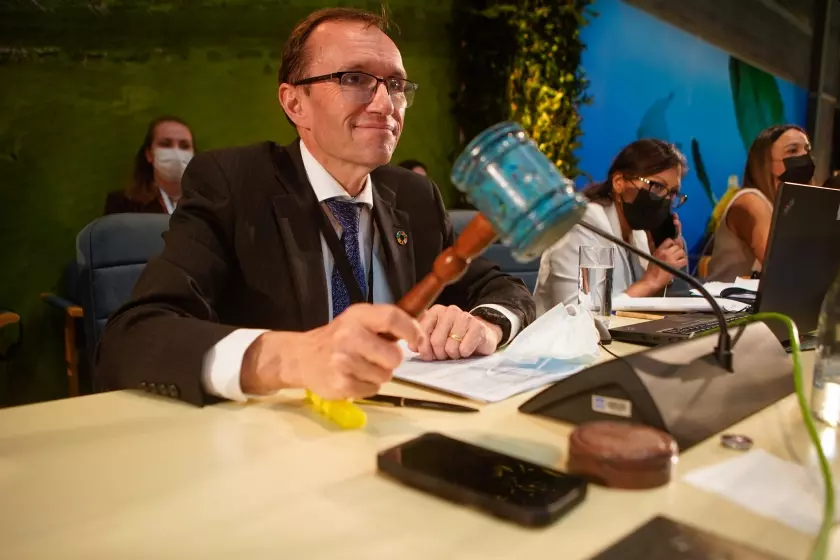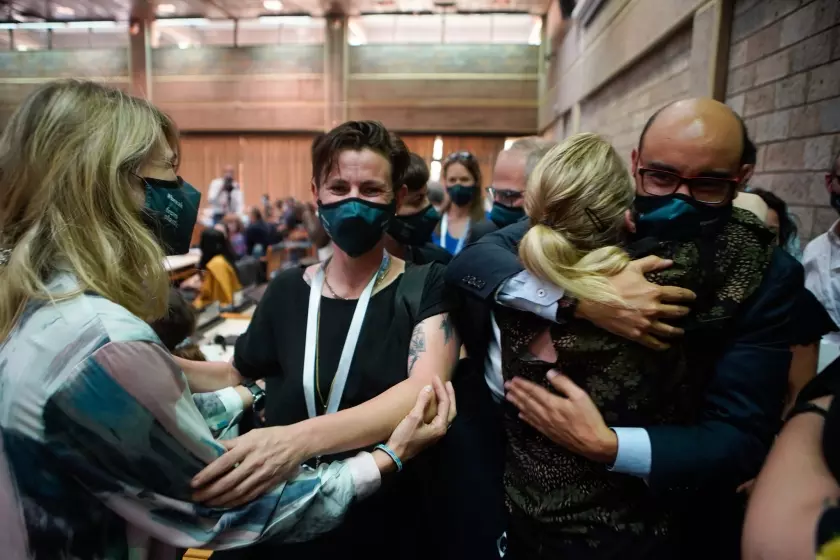Heads of State, Ministers of environment and other representatives from 175 nations endorsed this landmark agreement that addresses the full lifecycle of plastic from source to sea. Plastic production has risen exponentially in the last decades and now amounts to some 400 million tons per year– a figure set to double by 2040.
Inger Andersen, Executive Director of the UN Environment Programme (UNEP), said the agreement is the most important international multilateral environmental deal since the Paris climate accord.

Inger Andersen, Executive Director of the UN Environment Programme (UNEP), brings down the gavel on the resolution.
UNEA 5.2 has given us an opportunity to soar. The negotiators have done an amazing job. For adoption today, we have resolutions that can add thrust to our leap, direction to our flight. They cut across the triple planetary crisis.
But of the resolutions that you will adopt, there is one big-ticket item that stands out.
As I told negotiators a few days ago, the world is demanding that we act on plastic pollution. They, the negotiators, have delivered the first step in this process by agreeing to establish an Intergovernmental Negotiating Committee (INC) that will forge a global agreement on plastic pollution.
This would have been unthinkable just a few years ago. But today, here in Nairobi, in the only United Nations Headquarters in the developing world, in the environmental capital of the world, you are taking a crucial step to turn the tide on plastic pollution. This is a historic moment. I congratulate everyone involved for bringing us to this point. But a lot of work lies ahead to deal with the sheer scale of plastic pollution.
Look, in the space of one human lifetime, we have created a massive problem. I remember my mother telling me about sitting in a café immediately after Denmark had been liberated, before I was born. At the table next to her were two American businessmen with colourful blocks made from a strange new material. As she eavesdropped, the curious 18-year-old schoolgirl heard them say, “This is plastic. This is the future.”
These businessmen foresaw only a future of profit and convenience. They did not foresee a future – now our present – in which plastic pollution is everywhere, from the deepest ocean trench to the highest mountain peak. We see this pollution. We feel its climate impacts. We live with the sheer waste of taking a versatile, durable material and making it disposable – losing all value instead of retaining it.
Now we must make the wrong-headed way we manufacture and use plastic the past.
Distinguished guests, the world is watching. I ask you to adopt the INC resolution so that negotiations can start, and we can then land the agreement itself at the earliest possible opportunity, and no later than, the end of 2024.
And as we embark on this journey, let us be clear that the agreement will only truly count if it has clear provisions that are legally binding, as the resolution states. It will only count if it adopts a full life-cycle approach – stretching from design to production to circularity to reducing, managing and preventing waste.
We need to explore all options, including goals for new raw polymers brought into the economy. We need to explore monitoring and reporting mechanisms to support national action. We need to set in place financing mechanisms and means of implementation. We need to provide incentives for all stakeholders and engage with business. And, finally, we need to ensure that the agreement has real political support at the highest level – to both agree on the deal in record time and start implementing it.
Today, the gavel came down on a historic resolution at the resumed fifth session of the United Nations Environment Assembly (UNEA-5.2) in Nairobi to end plastic pollution and forge an international legally binding agreement by 2024.
Tags: The Plastic Pollution Resolution - UNEA 5-2



